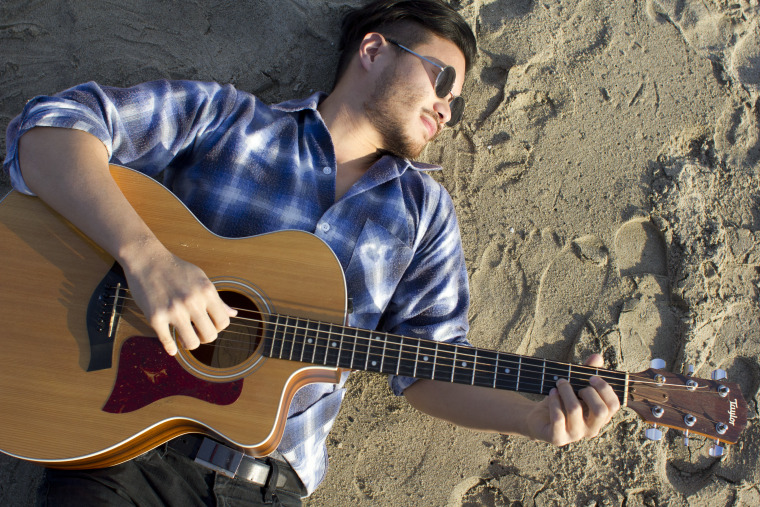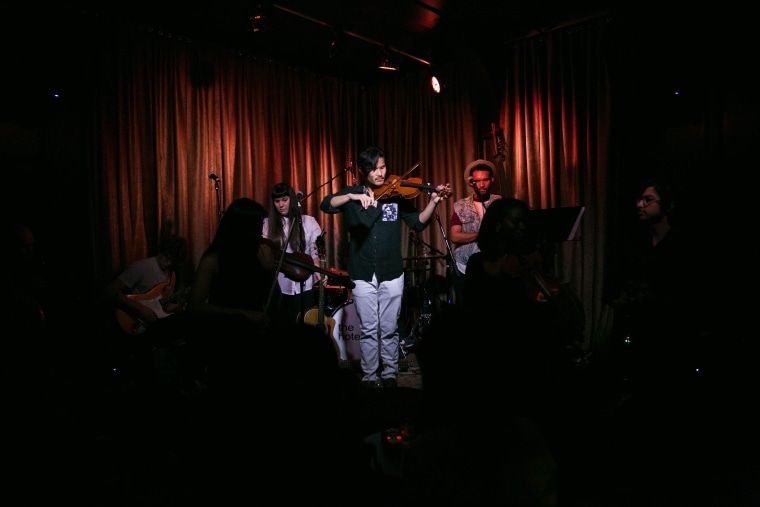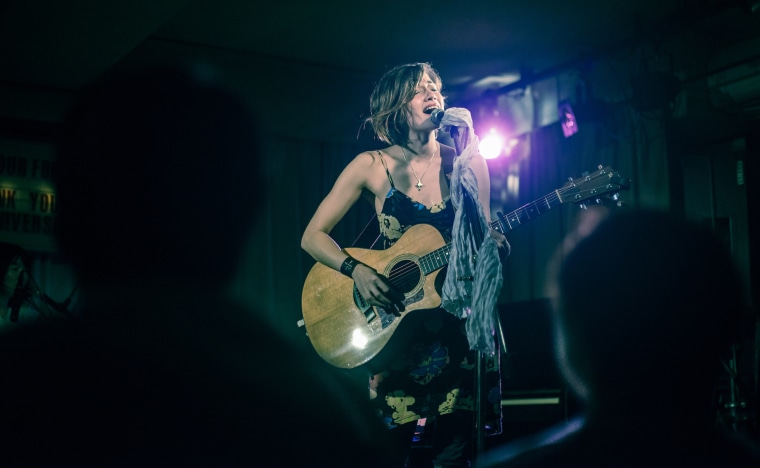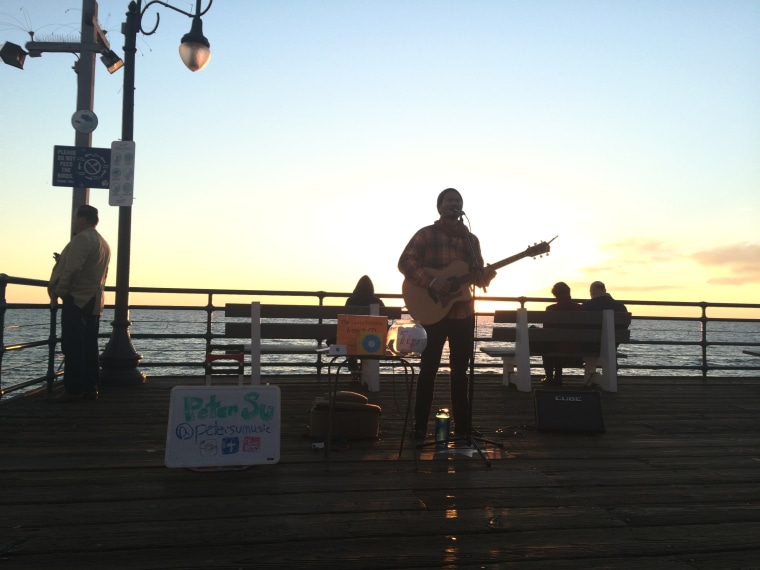One of the first times singer-songwriter Peter Su performed on the streets, it was outside of the Goldman Sachs corporate office in Century City, California. His first tip was half a sandwich — and a long-lasting feeling of fulfillment.
“I thought, maybe I’ll understand these people because I used to live in this world,” Su told NBC News. “I played my guitar for several hours without a single tip. Sometimes people thought I was homeless; they would give me their spare change and unfinished sandwiches. At the very end of the day, a lady came up to me and gave me a $20, out of pity. It was the weirdest feeling, like being someone else inside my own skin.”
Su grew up in the San Francisco Bay Area, where from a young age he launched into music, learning to play the guitar, violin, and piano as well as joining chorale groups and bands throughout high school.
“We were rehearsing several hours a day, and I was learning to sing," Su said. "I was really young, and there was this moment when I first realized how beautiful music was. It was probably one of the first times I felt connected.”
“I don’t even look at the tip jar. My intent was always to have fun out there, to entertain, and to connect with people. That’s what it’s about, and busking is a good vehicle to connect.”
But Su took a hiatus from music when he enrolled at the University of California, Berkeley as a finance major. While his best music friend started a band, Su joined a business fraternity and later made the choice to go corporate after graduation, being hired as an investment banking analyst at Goldman Sachs in San Francisco.
“It was everything I thought I wanted,” he said. “And I worked super hard for it. Sometimes I was working 100 to 120 hours a week. If I came home at midnight, I was super happy. If I could do my laundry, I’d be winning.”
After two years in San Francisco, Su moved to Menlo Park to work as a venture capitalist. There, he met coworkers who were pursing their passions.
“In the corporate world, people only see one side of you: the professional," he said. "They don’t want to see the emotional or creative side — and that’s what I wanted to show. I was sitting in my cube, watching other people around me create things and create music, and I just knew I had to be creating. I was thinking about music the whole time.”
RELATED: At 'We Own The 8th,' Support and Guidance for Asian-American Creatives
Su slowly rediscovered his musical side, singing at open mics and small gigs, and getting comfortable with performing. After two years as a venture capitalist, Su took a leap of faith and decided to pursue music full-time.
He moved to Los Angeles in 2013 and joined the Songwriters School of Los Angeles, where he wrote music daily. Soon he met a friend who busked — performing in public place for tips or self-promotion — to practice show skills, and he wanted to give it a try.
“My first time busking was at farmers’ markets,” Su said. “Just my guitar and me, no amplifier. I was playing the same four cover songs on loop … I think that day I made 4 bucks. The next day I made $6. I was super happy.”
After a rough few weeks, Su decided to play different LA neighborhoods, trying out different audiences. He busked in the diverse Highland Park, tourist-centric Venice Beach, gentrifying Silverlake and Echo Park, and outside trendy bars.
“I was seeing what works with different audiences," he said. "Some people would compliment my style and tip me. Sometimes drunk people would come out of the bars, form a circle around me and sing along. Others would just tell me to stop. It kind of hurt, but at least I was getting a reaction.”
It wasn’t until fall 2015 that Su ventured out to Santa Monica, where street-performing culture is as diverse as its residents. By then, he knew enough covers, was making better tips, and had conditioned himself physically to play the Santa Monica Pier for several hours. His favorite spot to perform was at the end of the boardwalk, spot number 14, which had a nice view of the ocean.
“People actually wanted to stay and listen to me,” he said. “I would take song requests, improvise, perform originals. I was selling mixtapes. It was a cool transformation, from feeling actually homeless to becoming the ‘star’ — and only Asian-American busker — of the pier.”

The beachside busking scene eventually paved the way for Su’s songwriting process.
“Out on the pier you meet interesting personalities: clowns, break-dancers, magicians — it’s like the circus,” he said. “But these were my coworkers, and we all looked out for each other. It’s a collaborative, not competitive, environment.”
Su fundraised $26,000 on Kickstarter to help him solo produce and record at the Sunset Sound studios. His debut album, Lions on the Beach, was released this year, and Su performed a sold-out release show in April at the Hotel Café.
“Going back to those hundreds of times I busked in front of crowds on the street helped me to perform naturally, centered, for those 45 minutes onstage," he said. "By putting myself out there, I learned that people actually wanted to support me … I just needed to let them know how.”

The busking experience was different for Kat McDowell, a friend of Su's who also occasionally busks in Santa Monica. The 32-year-old musician and YouTuber was born in Tokyo, Japan, and grew up on a small island in New Zealand.
McDowell learned piano at age 6, went on to vocal lessons, and eventually picked up the guitar as a teenager. Wanting a challenge and to expand her repertoire, she joined various bands in high school, took up jazz music in university, and began performing regularly.
She ties her musical background to her Japanese culture and grandmother. “The creative gene was always inside of me. My grandmother, who has dementia, really loves to sing, so it’s a very special connection I have with her,” she told NBC News.

At 21, McDowell had a catalog of self-written songs and wanted to expose her music. With support from friends and family, she left her island home to perform worldwide — and later found herself back in Tokyo. She took on various music jobs and eventually a manager, who led McDowell to sign a three-year contract with a major Japanese label.
The label wanted McDowell to promote her first few albums through an unconventional route: street performances. Several times a week, McDowell set up her amplifier, microphone, and guitar in crowded areas around Tokyo, especially at Shinjuku Station and the famous Shibuya street crossings.
“Busking was practically frowned upon in Japan,” she said. “Sometimes we got kicked out of places. They don’t respect musicians in the same way because you’re out on the street, and they don’t tip you. You’re out there purely to self-promote and to entertain.”
Tokyo’s busking culture was also more isolated, McDowell said, compared to bustling metropolitan areas like New York or Los Angeles.
“The level of respect was different no matter where I busked; whether in the U.K., New Zealand, the U.S., or Japan. It makes you tough as a musician,” McDowell said. “Even though I both spoke [and wrote a few songs in] Japanese, the dilemma at first was that my sound wasn’t really ‘Japanese enough;’ I’m light-skinned and don’t look Japanese enough.”
“The busking scene is really hard, when you’re not given a stage and you have to create one for yourself," she continued, "Eventually, you just have to get people to listen.”
After a few more years performing around Japan and meeting her husband, McDowell separated from the label and moved to LA to continue pursuing and performing music in the U.S.
While releasing several albums and EPs independently, McDowell has since collaborated with Asian and American musicians, performed in cultural festivals and shows around the country, and started promoting her music, songwriting tips and skills through videos on YouTube, where she has over 12,200 subscribers.
She is a part of YouTube’s Next Up Creator Class, and now busks for fun at Santa Monica’s Third Street Promenade.
McDowell said that, as difficult as it can be, busking can be a good way to grow community and develop as an artist. For those willing to put in the work, it can introduce them to other opportunities, a sentiment Su agrees with.
“I don’t even look at the tip jar," he said. "My intent was always to have fun out there, to entertain, and to connect with people. That’s what it’s about, and busking is a good vehicle to connect.”
Follow NBC Asian America on Facebook, Twitter, Instagram, and Tumblr.
Correction: An earlier version of this article stated that Peter Su worked at Goldman Sachs in New York City. He worked for the company in San Francisco.
